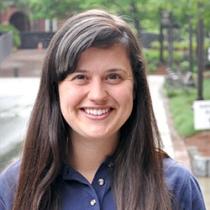
Elizabeth Scottie-Beth Fleming Lindsley
What is your next adventure? I'll be a researcher for Sandia National Labs, in Albuquerque, New Mexico. My research will focus on anything that supports their mission of promoting national security. The great thing is, I solved that 'double body' problem that comes up with a lot of doctoral grads: I was able to work out a deal where I'll work for Sandia remotely -- from Atlanta -- because my husband [T J Lindsley, ISYE '04] has a job that has to be done here.
What are you most looking forward to in your next adventure? The biggest thing is: I'll be in the workforce and will be able to work with other professionals doing work that has a real and immediate impact. It's a lot different from working on a dissertation, where a lot of your work is independent, on your own. By comparison, the research area I'll be working in will put me in contact with people from computer science, psychology, graphic design, management...
Did you have any previous co-op, internship, or research experience in this area that prepared you? I did three stints at Johnson Space Center - working as a design engineer in GNC, thermal, and mission ops. I got to see what goes into a space mission from so many angles. I also did research with Dr. Saleh on mathematical models to explain how launch vehicle systems are chosen. I got a conference presentation and a journal paper out of that. When I got into graduate school, I began working with Dr. [Amy] Pritchett, my current advisor, on research that focuses on how people make decisions.
What about your educational experience at GT-AE helped your to achieve your goals? The School's reputation means a lot out there. I mean, with every employer I approached, it was clear they were only recruiting students from the most prestigious schools. And Georgia Tech Aerospace Engineering is at the top of that list. It opens doors. And usually there are Georgia Tech alums already working there or they knew the work of Georgia Tech alums. I had never thought of Sandia, but because one of my colleagues from graduate school [Jaret LaFleur] already worked there and could tell them about me, I had no problem getting an interview.
What advice would you give someone who wanted to follow in your path? Fan out, explore. When I came to Georgia Tech, I came to work for NASA. And then I worked for NASA [laughs]. NASA was great, but the experience of being challenged at NASA taught me that I wanted to keep learning in other areas. The other number one thing is: your coursework isn't everything. It's important, but there are other things. I did the sorority thing. I did co-ops. I studied in Oxford. Now, I wasn't the number one student in my classes - and for the first three years I struggled - but, right about the time I started researching with Dr. Saleh, I hit a turning point. I realized that I had to find resources on my own and use them if I wanted to do well. If I didn't get the material, I had to look for new ways to relate to it. I started talking to professors, looking into tutoring, talking with people in my classes.